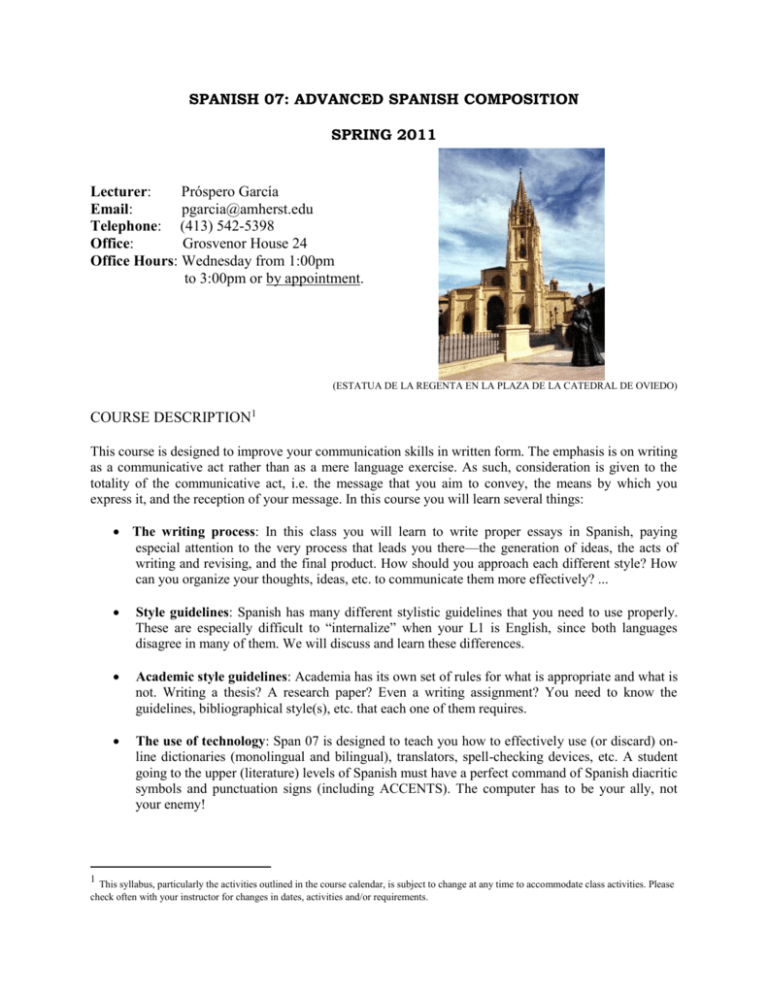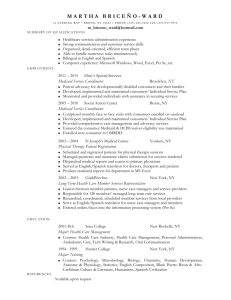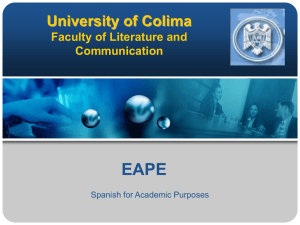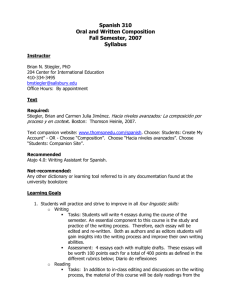capítulo 1: la descripción
advertisement

SPANISH 07: ADVANCED SPANISH COMPOSITION SPRING 2011 Lecturer: Próspero García Email: pgarcia@amherst.edu Telephone: (413) 542-5398 Office: Grosvenor House 24 Office Hours: Wednesday from 1:00pm to 3:00pm or by appointment. (ESTATUA DE LA REGENTA EN LA PLAZA DE LA CATEDRAL DE OVIEDO) COURSE DESCRIPTION1 This course is designed to improve your communication skills in written form. The emphasis is on writing as a communicative act rather than as a mere language exercise. As such, consideration is given to the totality of the communicative act, i.e. the message that you aim to convey, the means by which you express it, and the reception of your message. In this course you will learn several things: The writing process: In this class you will learn to write proper essays in Spanish, paying especial attention to the very process that leads you there—the generation of ideas, the acts of writing and revising, and the final product. How should you approach each different style? How can you organize your thoughts, ideas, etc. to communicate them more effectively? ... 1 Style guidelines: Spanish has many different stylistic guidelines that you need to use properly. These are especially difficult to “internalize” when your L1 is English, since both languages disagree in many of them. We will discuss and learn these differences. Academic style guidelines: Academia has its own set of rules for what is appropriate and what is not. Writing a thesis? A research paper? Even a writing assignment? You need to know the guidelines, bibliographical style(s), etc. that each one of them requires. The use of technology: Span 07 is designed to teach you how to effectively use (or discard) online dictionaries (monolingual and bilingual), translators, spell-checking devices, etc. A student going to the upper (literature) levels of Spanish must have a perfect command of Spanish diacritic symbols and punctuation signs (including ACCENTS). The computer has to be your ally, not your enemy! This syllabus, particularly the activities outlined in the course calendar, is subject to change at any time to accommodate class activities. Please check often with your instructor for changes in dates, activities and/or requirements. Writing styles and techniques: What is the difference between a narrative and a descriptive text? What are the formal guidelines to write formal (and informal) letters in Spanish? How should you approach writing a long research paper (possibly your first in Spanish)? What are the effective ways to present your thesis, conclusions, etc.? Grammar: Span 07 is not a grammar or language class like the ones you might have taken before. However, we will review grammar. You cannot write proper essays without mastering, for instance, all the verbal tenses, their uses, and the context(s) in which they are used. An intermediate/advanced level of Spanish is taken for granted, since the course will focus on the most advanced aspects of grammar. Syntax, morphology, phonetics, and orthography: Span 07 is not a linguistics class. However, we will cover basic aspects of syntax (word order), morphology (word formation), orthography (spelling) and phonetics (writing and pronunciation of sounds) in order to make you a better communicator. Literature: Even though Span 07 is not a literature class, we will do a lot of reading. Without reading a lot of texts in Spanish, you cannot be a good writer (in Spanish). Henceforth, we will select readings that will help you in your writing. ENTRANCE REQUIREMENT: Completion of SPAN 05/06, or Language Coordinator Consent: Prof. Victoria Maillo (vmaillo@amherst.edu) TEXTS: 1. Whitley, M. Stanley & Luis González (2007). Gramática para la composición. New Jersey: Georgetown University Press. 2. Sender, Ramón J. (1999). La tesis de Nancy. Barcelona: Editorial Casals. 3. Montero, Rosa (2008). Estampas bostonianas y otros viajes. Madrid: Ed. Punto de lectura. 4. A detailed bibliography of the choice of the student (with Professor’s approval) for the Final Project. 5. A bilingual dictionary English-Spanish is recommended. ASSESSMENT: Components Writing Assignments Final Project & Presentation Lecturas y vocabulario Reseñas Tarea Quizzes Foro Participation Midterm & Final Percentage 25% 20% 5% 5% 5% 10% 10% 10% 10% Attendance to 5 events Mandatory Grades are reported in the following categories (Amherst College): A+, A, A-, B+, B, B-, C+, C, C-, D, Pass, F Grading scale A+ 97-100 A 94-96 A90-93 B+ 87-89 B 84-86 B80-83 C+ 77-79 C 74-76 C70-73 D 60-69 Participation: Includes attendance, preparation for and participation in class, timely completion of assignments, etc. Class participation is always expected and extremely welcomed. Please notice that participating in class does not mean getting all the answers right or speaking proper Spanish, but rather TRYING to do so. A student who participates often and, say, gets “all answers wrong” will get exactly the same credit as a student who participates and gets all answers right (i.e. full participation credit). As a reminder, this grade is given at the end of the semester, and it really makes a difference in the final percentage. Quizzes: The quizzes are designed to test your knowledge and comprehension of the concepts explained in class, but they are secondary to Writing Assignments and other written projects. Notice that, depending on the lesson, the nature of the quizzes might be VERY DIFFERENT. Some will focus on grammatical aspects, while others will target style guidelines or concepts, for example. Final Project (I): The Written Final Project Every student must do an individual final project analyzing a cultural, linguistic, or literary work of his / her choice. Please make your choice early in the semester, as it has to be approved by me well in advance. In class we will cover the basic aspects of your final project, style, length, etc. but you have to do most research on your own. If you think I can be of help with any aspect of your Final Project, do not hesitate to contact me. The sooner, the better. There are several deadlines outlined in the course calendar. You will be provided with updates as the semester moves foward. Final Project (II): The Oral Presentation Before handing in the Final Project (last day of classes), you will present your work to your fellow students at the Spanish Conference (May). Presentations should last approximately 20-25 minutes, and they should be thoroughly prepared, and—of course—conducted entirely in Spanish. The Final Project will be thoroughly explained during the semester. Lecturas and vocabulario: Every Monday (with some exceptions) we will discuss in class a chapter(s) of either Estampas bostonianas y otros viajes or La tesis de Nancy. In order to be prepared for these weekly discussions, you will be asked to make a list of, at least, 5 Spanish words that you have found challenging while reading. You will then look for the meaning of those words and write an example of its meaning in a sentence. You will be required to hand in your list and sentences every Monday before the discussion. Reseñas (11): Every student must write, on a weekly basis (with some exceptions), on a chapter of the book Estampas bostonianas y otros viaje or La tesis de Nancys. These “reseñas” consist on a paragraph of approximately 100-150 words (this paragraph has exactly 102 words, so it is not much!) due every Monday (with some exceptions) that you will hand in to me in class. Prior to correcting them, we will read some of them out loud and discuss. The purpose of the “reseña” is to evaluate ideas, to develop your communicative skills, and to have an open discussion (i.e. conversation) in the classroom. Tarea: On a daily basis I will ask you to complete some activities from handouts or from the grammar book. While these activities might just seem like busy work sometimes, it is extremely important that you complete them. They will help you perform better in Spanish and will boost your academic development. You will pass your homework in to me at the beginning of each class unless you are told otherwise. Writing Assignments (5 x 2): Writing Assignments are the most important part of this course. They are important to practice grammatical structures, spelling, etc. as you may have done in other—previous—classes. However, since this course is devoted to Advanced Composition we must take the writing process several steps further. I will expect you not only to write in clear, understandable Spanish, but also to be aware of the writing process itself, of the style guidelines of academia / papers, and of the choices you make (or do not make) when writing. Please check the Style Guidelines for Writing Assignments in this syllabus in order to comply with them. Writing Assignments are scheduled in the following manner: 1. First Drafts are corrected by me and are worth a 40% of your final grade. 2. Second Drafts are corrected by the TA and are worth a 60% of your final grade. Please notice that you MUST attach (STAPLE!) the corrected First Draft to your Second Draft. Also, be aware that the number of words on the Second Draft (450) is higher than on the first one (350), so you need to expand beyond the corrections. The TA will focus on correcting your style, guidelines, etc. You will receive two grades, one for the First Draft and another for the Second Draft. By combining both grades, you will get the definitive grade on each assignment. Foro: You will watch 7 movies and write comments about them in an online forum. These movies are available via streaming in the course’s website. You are expected to post at least 2 comments per movie. Movies will be available from day one, therefore, make sure that to watch them and post your comments before the due date. Attendance to Events organized by the Spanish department (5): You will have to attend to five events organized by the department of Spanish to pass this course. You may attend to 3 Spanish Tables, 2 activities organized by the Spanish House, and vice versa. The Spanish Table meets every Friday in Valantine Hall from 12:30 pm. to 2:00 pm. I will provide you with the activities organized by the Spanish House along the semester. Remember, participation in five or less of these activities will affect your grade negatively. Attendance to five of these events, at least, is mandatory in order to pass this course. COURSE POLICIES AND REQUIREMENTS: Attendance and Punctuality: As Span 07 is a class in which your performance is evaluated, attendance is compulsory. Only absences due to religious holidays, illnesses (documented) and emergencies (documented) will be excused. Athletes, musicians, and other students involved in school clubs / organizations that require travel, as well as seniors that are interviewing for jobs, should consult with me at the beginning of the semester regarding their absences. Unexcused absences will result in a lower participation grade. In all cases, you are responsible for contacting a classmate to find out what you missed. You are also expected to arrive on time, as late arrivals disrupt the class. Note that tardiness will result in a lower participation grade. Academic Honesty: I expect that you have read, understood, and are prepared to abide by Amherst College’s policies on academic honesty. You are expected to present only your own work in this class. Use of electronic / online translators (apart from being completely useless), copying from the Internet or other sources, as well as help from a Spanish-speaking person, are strictly prohibited. You are more than welcome to ask me, your T.A., a tutor or other classmate general questions, but you cannot have another person look over and correct your work. If you think you need extra help with some assignments, feel free to discuss it with me, and we will make arrangements. Please Notice! Do not have anybody but yourself go over your Writing Assignments, Final Project, etc. Help, if you need it, should always come from a T.A. or, better, myself. But even the T.A. cannot correct your writing, only guide you in the right direction... The best way to go, if you think you need extra help with the assignments, is to contact me as early as possible in the semester. Late work policy: All work is due on the date indicated on the course syllabus during the scheduled class meeting time. Late work will be marked down 5% for each calendar day (including weekends) that the work is turned in after the due date. After two weeks (fourteen days) has passed the work will no longer be accepted and the grade will remain a zero. Early work is always accepted. Cell Phone Usage: Out of courtesy for all those participating in the learning experience, all cell phones and pagers must be turned off before entering any classroom, lab or formal academic performance or event. Extra credit: There will be no extra credit assignments for this class. GUIDELINES FOR WRITING ASSIGNMENTS All writing assignments and compositions must be written in an ACCEPTABLE way, and therefore must abide by the following style guidelines without exception. Please notice that I expect you to familiarize yourself with college / academe’s guidelines and abide by them. This will help you in the future if you need to write assignments, final papers, etc. for other, more advanced classes: All assignments must be typed and double-spaced (for corrections). Font: Times New Roman (12 pt.) recommended, but you may use similar ones. Please write your complete name (don’t shorten it, please!) and date (in Spanish). The format for the date in Spanish is ALWAYS, ALWAYS as follows: 11 de junio del 2011 Include, at the top of the page, the word-count, with the actual number of words you have written (Microsoft Word does this automatically). Do not tell me how many words you should have written, but how many you actually have. You may use both sides of the page to print your writing assignment (it saves paper and makes it easier to correct). If you choose not to do so, make sure both sheets are stapled. No loose sheets are EVER accepted. Please, STAPLE. Orphan lines (i.e. last line/ two lines of a text hanging over a new page) should be avoided. Review your work and edit it! If your complete writing assignment consists of 80 lines, you may not have 79 on one page and 1 in the next one. Take something out, edit, or add some lines. Never use words in ENGLISH, not even in parentheses or as an explanation to the Spanish text, unless I advise you otherwise. This, of course, does not apply to English words used in Spanish (e.g. whiskey) or Proper Nouns (e.g. John Smith, Discovery Channel, For Whom the Bell Tolls, The Matrix...). In the case of Proper Nouns, please do not attempt to offer a Spanish translation. It will probably be wrong. As there is a large quantity of students that write English words throughout Spanish compositions, one full point will be deducted for every case. All assignments should be SPANISH SPELL-CHECKED. THE MOST IMPORTANT RULE: ALWAYS READ your assignment after you print it at least once. The computer will, for sure, change some of the things you have written in your assignments. I cannot hold your computer responsible, so please review. Also notice that if the computer changes a word and you do not correct it later, it gives a very poor impression of your work, and it automatically tells me you have not reviewed it! Calendario de español 07 – Spring 2011 Abreviaturas: TB = Textbook ; TN = La tesis de Nancy; EB = Estampas bostonianas; R = Repaso Please be aware that the calendar is subject to change based on the needs of the course. Sign-up sheets for presentation and schedules for other class assignments will be distributed in class. FECHA Lun 24 de enero ANTES DE CLASE TB: Leer pp. XV-XIX 26 de enero Vie 28 de enero Lun 31 de enero Mie 2 de febrero Vie 4 de febrero DEBERES (Entregar en clase) Presentación del curso y del syllabus. CAPÍTULO 1: LA DESCRIPCIÓN Mie EN CLASE TB: Leer lección 6 (pp. 46-52). Descargar handoout uso del diccionario En esta unidad se tratarán los siguientes temas: La ortografía y puntuación del español. El presente del indicativo y el infinitivo. La flexión de sustantivos, artículos y adjetivos. Los verbos copulativos. La conjunción, la negación, la ubicación y las preguntas. El uso del diccionario. Estilo del ensayo: La descripción. Conceptos básicos de escritura. Entregar párrafo de Las reglas de acentuación. descripción personal (200 Ejercicios de acentuación. palabras) TB: A, B, C, D, (pp. xixxx) Pautas para una buena composición. Foro: “La torre de Suso” La descripción. Handout uso del Pautas para hacer una buena reseña. diccionario. Taller de uso del diccionario TB: J (p. 18) monolingüe y bilingüe. El uso de la tecnología e Internet. TB: Leer lección 5 (pp. 37-43) EB: Prólogo (p 9.) e Irak, una hierba… (p.15) Discusión EB Composición 1ª: Descripción (350 p.) Vocabulario #1 TB: Leer lección 1 (pp. 1-8) Descargar handout unidad 1 Reseña #1 TB: E,F (pp.8-9) Profundizando en el uso del presente y el infinitivo. (R) Los verbos perifrásticos. (R) Irregulares y cambios de raíz. (R) La concordancia gramatical. (R) El género gramatical. (R) Profundizando en los verbos copulativos. (R) Diferentes usos de ser/estar/tener. (R) TB: Leer lección 2 (pp.9-16) TB: Leer lección 3 (pp. 18-25) Foro: “Café solo o con ellas” TB: E, H (p. 17) y C, G, H (p.26) Lun 7 de febrero EB: Estampas bostonianas (p. 31) Discusión EB Vocabulario y Reseña #2 Mie 9 de febrero TB: Leer lección 4 (pp. 27-34) Completar repaso Las conjunciones.(R) Oraciones negativas e interrogativas.(R) Revisar repaso. Composición 1b: Descripción (450 p.) TB: E, F, G, H, I, J (pp.35-36) Vie 11 de febrero Estudiar el capítulo 1 CAPÍTULO 2: EL REPORTAJE Quiz sobre el capítulo 1 La Torre de Suso Café solo o con ellas En esta unidad se tratarán los siguientes temas: El sujeto, el objeto directo y los reflexivos. Los pronombres personales. El objeto indirecto. El presente del subjuntivo y el imperativo. El discurso indirecto, las cláusulas relativas y el modo. Estilo del ensayo: El reportaje y las instrucciones. Discusión EB . Vocabulario y Reseña #3 Lun 14 de febrero EB: Australia, la última frontera (p.73) Mie 16 de febrero TB: Leer lección 11 (pp. 96-102) TB: Leer lección 12 (pp. 105110). El estilo directo e indirecto. El subjuntivo y sus aplicaciones. (R) El reportaje y sus tipos. Composición 2a: El estilo indirecto y la probabilidad (350 p.) TB: B, D, E (p. 103) Vie 18 de febrero TB: Leer lección 7 (pp. 57-65) TB: Leer lección 9 (pp. 77-84) Partes de la oración: El sujeto. (R) La transitividad: el objeto directo.(R) Verbos reflexivos.(R) Objeto indirecto: Función y usos. (R) Abstract del proyecto final (250 palabras) Foro: “El método” TB: A, D, E (pp. 65-66) y B, F, G, H (pp.85-86) Lun 21 de febrero TN: Introducción, cartas I y II (pp. 5-67) Discusión TN. Vocabulario y Reseña #4 (TN) Mie 23 de febrero TB: Leer lección 8 (pp. 67-74) Descargar handout pronombres Los pronombres: Tipos, usos y diferencias. (R) Vie 25 de febrero TB: Leer lección 10 (pp. 88-92) Presente de subjuntivo. (R) El modo imperativo. (R) Composición 2b: El estilo indirecto y la probabilidad (450 p.) TB: C, D, E, F, G (pp. 7475) Foro: “El truco del manco” TB: D, F, I (pp. 93-95) CAPÍTULO 3: LA NARRACIÓN Lun 28 de febrero TB: Leer lección 13 (pp. 115118) y lección 14 (pp. 121127). En esta unidad se tratarán los siguientes temas: El pretérito y el imperfecto, su formación. Pretérito vs. Imperfecto: su función. El pasado de subjuntivo. Los adverbiales de modo y tiempo. La gramática de la narración. Expresar impersonalidad. El participio y los tiempos perfectos. El futuro y el condicional. Las cláusulas adverbiales y condicionales. El gerundio y los progresivos. El tiempo y los tiempos. Estilo del ensayo: La narración. Formación del pretérito y el TB: B, C, D, E, F (p.129) imperfecto: Usos y diferencias. (R) Práctica. Mie 2 de marzo TB: Leer lecciones 17 (pp. 147-152), 18 (pp. 155-160) y 24 (pp. 211-217). Descargar repaso Vie 4 de marzo Estudiar Unidades 1-3 Lun 7 de marzo TN: Cartas III, IV y V (pp. 71-131) Mie 9 de marzo TB: Leer lección 15 (pp. 130136). Vie 11 de marzo TB: Leer lección 16 (pp. 138144) Gramática y cambios empleados en la Composición 3a: La narración. narración (350 p.) El ritmo narrativo, el punto de vista y Completar repaso la organización en la narración. La descripción y el lenguaje empleados en la narración. Revisar repaso MIDTERM EXAM Material Cubierto en los capítulos 1-3 La tesis de Nancy (Introducción, cartas I, II) Estampas bostonianas ( páginas 9-96) El truco del Manco / El método Discusión TN. Vocabulario y Reseña #5 El pasado de subjuntivo: Formación, uso y función. (R) Práctica. Las cláusulas adverbiales en la narración. Tipos de adverbiales y uso. Bibliografía en español comentada (5 obras al menos) TB: E, F, G (p. 137) TB: B, C, D, G, I (pp. 144-146) SPRING BREAK DEL 12 AL 20 DE MARZO Lun 21 de marzo EB: Esquimales (p.97) Discusión EB Vocabulario y Reseña #6 Mie 23 de marzo TB: Leer lección 20 (pp. 175179) Composición 3b: La narración (450 p.) TB: D, E, H (pp. 180-181) El futuro y el condicional, usos y diferencias. (R) Especulación y conjetura. (R) Práctica. Las cláusulas adverbiales (II), las condicionales y su uso en la oración. Práctica. Discusión EB Vie Lun 25 de marzo 28 de marzo TB: Leer lección 21 (pp. 182190) EB: Sahara, la tierra prometida (p.123) CAPÍTULO 4: LA EXPOSICIÓN Mie 30 de marzo TB: Leer lecciones 19 (pp. 165-171), 22 (pp. 193-199) y 23 (pp. 202-207) En esta unidad se tratarán los siguientes temas : La frase sustantiva y la referencia. Las cláusulas relativas. Los números. La sustantivación y el neutro. La comparación. Estilo del ensayo: La exposición. Vie 1 de abril TB: Leer lección 25 (pp. 223-232) Primer borrador del proyecto final (3 y ½ páginas) Foro: “El orfanato” TB: F, G, H, I, J, K (pp.191-192) Vocabulario y Reseña #7 Formación y funciones del participio. Los tiempos perfectos y su uso en la narración. (R) El gerundio y sus usos en la oración. El uso de los tiempos en la narración. Composición 4a: La exposición (350 p.) Los sustantivos y las cláusulas sustantivas. (R) Los artículos y adjetivos: tipos y posición. (R) Foro: “Los cronocrímenes” TB: C, E (pp. 232, 233) Lun 4 de abril TB: Leer lección 26 (pp. 234-240) 6 de abril TB: Leer lección 28 (pp. 252-259) 8 de abril Estudiar Unidad 4 Mie Vie Las cláusulas de relativo: función y uso. (R) Las diferencias con el inglés. La sustantivación, los neutros y los relativos. (R) Algunos problemas con el inglés. Revisar repaso. Lun 11 de abril Mie 13 de abril Vie 15 de abril TB: Leer lecciones 32 (pp. 294-301) y 33 (pp. 303-309) Lun 18 de abril EB: Sombras chinas (p. 141) Mie 20 de abril TB: Leer lección 34 (pp. 312-318) Vie 22 de abril TB: Leer lección 35 (pp. 322-329) Lun 25 de abril Descargar repaso TN: Cartas IX y X (pp. 203242) Mie 27 de abril TN: Cartas VI, VII y VII (pp. 135-199) TB: Leer lección 31 (pp. 283-291 Descargar handout preposiciones Lun 2 de mayo Mie 4 de mayo Vie 6 de mayo Las preposiciones: tipos, usos y funciones. Énfasis en por y para (R) TB: C, G, H (pp. 291292) Segundo borrador del proyecto final (5 y ½ páginas) uso. El énfasis a través de cambios sintácticos. La pasiva: formación y restricciones en el TB: A, B, C, D, E (pp. 301-302) y B, D (p. 310) La eliminación del énfasis en la oración Discusión EB Vocabulario y Reseña #9 Conectores del discurso. La yuxtaposición. La nominalización La clausula sustantiva y su reducción al infinitivo. 29 de abril TB: B, C D E F (pp. 259261) Quiz Unidades 3 y 4 Composición 4b: La El Orfananto exposición (350 p.) Los cronocrímenes En esta unidad se tratarán los siguientes temas : Las preposiciones. Cambios de estructuras: el énfasis y el desénfasis (impersonalidad) Conectores. La clausula sustantiva. Estilo del ensayo: La argumentación Discutir TN Vocabulario y Reseña #8 CAPÍTULO 5: LA ARGUMENTACIÓN Vie TB: C, G, H (pp. 240-241) EB: Alaska, un país a medio hacer. (p. 161) Revisar repaso Discusión TN Quiz Unidad 5 El secreto de sus ojos Preparación para las presentaciónes Preparación para las presentaciónes Composición 5a: La argumentación (350 p.) TB: B, C, H (pp. 319-320) Foro: “El secreto de sus ojos” TB: C, D, H (pp. 330-331) Esquema de la presentación final Completar repaso Vocabulario y Reseña #10 Composición 5b: La argumentación (450 p.) Reseña y vocabulario 11 Entrega del proyecto final Presentación de los proyectos finales en la conferencia Presentación de los proyectos finales en la conferencia Proyecto Final (A entregar el lunes 2 de mayo en clase) Examen Final (se ofrecerá del 9 al 13 de mayo, durante la semana de exámenes finales) Capítulos 1-5 Estampas bostonianas y otros viajes (todo) La tesis de Nancy (todo) Grading Criteria for Class Participation & Preparation 10 pts per week; 10% of final grade Rating Points Excellent I greeted people and took leave using Spanish expressions. I used only Spanish throughout the class period. I listened attentively when others spoke and showed respect for my peers. I actively participated in all activities and discussions, including group work, and had a positive attitude. I came prepared to class every day. I never arrived late. My presence made a positive impact on getting task done. 8.6 – 10 Good I greeted people and took leave using Spanish expressions. I very occasionally used English, especially in pair/group work or without attempting to express myself in Spanish first. I sometimes got distracted, did not pay attention when others spoke, or was occasionally disrespectful. I showed interest in activities and participated, though sometimes passively rather than actively. I contributed to group work part of the time. I generally came prepared to class. Sometimes I arrived late in class. 7.8 – 8.5 Average I did not greet people/take leave using Spanish expressions. I frequently used English, especially in pair/group work, and/or I did not attempt to express myself in Spanish first. I frequently got distracted, did not pay attention when others spoke, or was disrespectful. I showed little interest in activities and participated passively rather than actively. I sometimes came prepared to class. Often I arrived late in class. 6.6 – 7.7 Poor I used more English than Spanish in class. I did not pay attention during activities. I sometimes slept, read the newspaper, did homework, using the phone,etc. during activities. I was often distracting and disrespectful of my peers. I was frequently unprepared for class, and did not contribute to the work of my group. I arrived late in class regularly. My presence in group work had little impact on accomplishing the task. * Daily attendance and participation is essential for improving your communication skills. Participation is required and will be graded. In order to participate, you must attend. You are expected to take an active role in all activities in order to achieve full points. Arriving late or leaving early will negatively affect your grade. Participation includes being prepared, volunteering, paying attention, asking for help when you need it, and SPEAKING SPANISH WHENEVER POSSIBLE. You can ensure the best participation grade (and gain the most from class!) possible for yourself by staying involved with the class, participating in class discussions, asking appropriate questions, and doing all the activities in class, even if you feel that your Spanish is not as good as that of others. Not using Spanish when appropriate will result in a lowering of your participation score. 0 - 6.5








